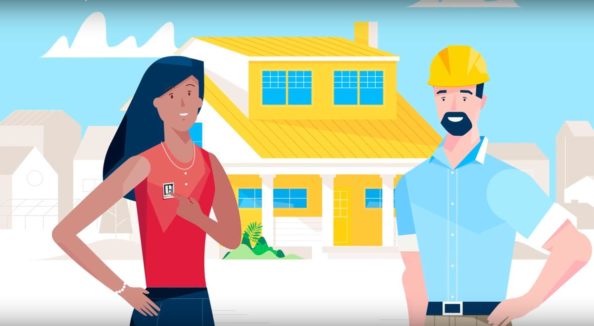Home Performance Counts
Your real estate agent knows why, your builder knows why. Ask them about home performance today!
If you’re looking for a home that is healthier, more comfortable and more energy efficient, it’s important to ask the right people the right questions. Real estate professionals and home builders have the information and resources needed to answer the questions that matter most. The resources below will help connect you with the knowledge you need to make informed decisions during the homebuying process, so you can get everything you want in your next home.
Home Performance Inside & Out
High Performance 101
You'll Feel the Difference
Ask Your Pros
Take a video tour of a high performance home.
Read MoreTake a closer look at the features that set high performance homes apart.
Read MoreHigh performance homes can provide benefits for you, your family and your community.
Read MoreAsking the right questions can help ensure you get the home you want for you and your family.
Read MoreVideo Tour
Home Performance Inside & Out
Take a video tour of a high performance home to discover the features that could make your family’s life more comfortable, healthier and more sustainable, and could potentially save you money on monthly utility bills.
Today’s homes are built differently. They aim to incorporate features designed to improve the quality of life of the people who live in them. This video outlines some of the differences between a high performance home and a traditional home. Explore how to work with your real estate professional and home builder to harness the benefits of a high performance home by asking the right questions.

The Green Difference
High Performance 101
Green and high performance homes may be more common and accessible in your local market than you think. Take a closer look at the home features that set high performance homes apart by improving comfort, reducing energy use and improving indoor air.
Over the years, homebuilding has evolved to include features that boost energy efficiency, improve indoor air quality and create a better living experience for homeowners, but few people have a clear idea of how the systems in their homes can affect their health, comfort and finances. Home performance focuses on the way a home is built so all the materials, features and systems work together to provide an optimal level of comfort. And thanks to smart technology, homeowners can easily access information to monitor their home’s energy use, air quality and more – allowing them to adjust their habits and see improvements real-time.
Home performance improvements include technical and system-designed differences that impact the whole house. Some features to look for in a home include:
- Improved insulation
- Moisture management
- Heating and cooling systems (age, efficiency)
- Whole-house fans or ventilation
- Appliances (age, efficiency, ENERGY STAR® certification)
- LED or other energy efficient lighting
- Low volatile organic compound (VOC) paints or wood
- Smart thermostats
If you’re thinking that these features sound like they’d be found in a green home, you’re right. Overall home performance isn’t just a list of green home features or materials, though. High performance homes bring together the operational and maintenance aspects of a home, often with systems that provide metrics that give you information (like energy use) you can track and try to improve upon.
Some homes have a variety of features that make them eligible for high performance certifications. Many high performance certifications are based on independent, third-party inspections and ensure that the hidden materials and systems behind the walls are installed correctly, are high quality, and function as intended to increase efficiency and, in some cases, promote healthier indoor living environments. When it’s time to resell, third-party certifications are an easy way to confirm construction practices and materials, providing more complete information for home valuation.

Remember, when you’re evaluating a home’s performance, your home builder or real estate professional can guide you through the building plans or new house, highlighting features that improve indoor health, conserve energy and water, and create a more comfortable home. These features aim to create a better living experience and improve you and your family’s quality of life.
High performance homes are available for you to experience firsthand in every geographic area and every market. By connecting with real estate professionals and home builders, you can get all your home performance questions answered before breaking ground or making a purchase.
It's In the Benefits
You'll Feel the Difference
High performance homes can provide benefits for you, your family and your community. Learn about healthier indoor air, safety, energy efficiency, walkability and more.
Think about the ease of living in a space that provides more comfort, better air quality, less noise, and more money in your pocket through energy and water savings – all while having access to the places you want to go. While not every high performance home is guaranteed to check all these boxes, they’re built with these principles in mind. Step into a high performance home, and you’ll not only notice a difference in the features you can see, you’ll also feel the benefit of those features that you can’t see behind the walls. For instance:
- Better and proper insulation can lead to more a comfortable living space.
- High-performing systems and appliances in a home often lead to quieter, more predictable operation and maintenance.
- Proper air movement and ventilation can lead to fewer allergens and healthier spaces.
- Sustainable building materials often use fewer chemicals and irritants than more traditional materials.
The Environmental Protection Agency (EPA) notes that most people spend roughly 90 percent of their time indoors and estimates that the air inside our homes and buildings is far more polluted than outdoor air. Several studies show that these indoor pollutants have the potential to cause health issues such as allergies, asthma or autoimmune disorders.
Have you ever noticed that fresh paint or new carpet odor? What you’re really smelling is often the off-gassing of the toxic components in these materials.
People living in high performance homes often note the major difference healthy indoor environmental quality can make – things like less respiratory irritation caused by chemicals or particulates and even fewer symptoms in people with asthma. All aspects of high performance homes contribute to an improved, cozy environment in which you can breathe easy, live, and relax comfortably with your family and friends.

But home performance doesn’t end with the four walls of the house. In addition to the comfort and health benefits provided indoors, many high performance homes offer outdoor benefits as well. Newer developments and established neighborhoods with upgraded or retrofitted homes often have increased walkability, access to parks and tree-lined streets. Studies show that these types of walkable communities can increase safety and accessibility. Having pedestrian-friendly access to parks, transit, shops and restaurants not only contributes to your quality of life, but could also boost your property value.
Each piece of the high performance home puzzle comes together to provide a home that adds to your personal comfort, wallet, health and peace of mind.

Got Questions?
Ask Your Pros
Asking the right questions can help ensure you and your family get the home you want. The right home builder or real estate professional can point you toward the cost savings and comfort you want in your next home. They’ll even connect you with helpful information and resources to provide the latest in home performance.
Finding the best home to meet your needs can be difficult, but help is available! Home builders can give you perspective on all the home performance features behind the walls that create a more comfortable indoor space. REALTORS®, members of the National Association of REALTORS®, are in the business of solving problems and connecting you with the best property for your needs. Consider asking some of the questions below when meeting with professionals so you get a more complete picture of a home’s performance and ensure your next home provides comfort, efficiency and a healthy living space.
Someone in my family has allergies and asthma.
What you want
Healthier indoor air quality
What features to look for in your next home
- Bathroom exhaust fan
- Kitchen range hood
- HEPA filter
- HVAC systems with sensors and automation
- Low VOC materials
What to ask about for your future home
- In this geographic location, are there benefits to having an automated heating, ventilation and air conditioning system with sensors that monitor moisture?
- What types of heating, ventilation and air conditioning system filters should I use given that a member of my household has asthma? And how often should I replace them?
- Do the bathroom and range hood exhaust fans vent to the outside of the house?
- Did you use building materials that emit fewer toxins?
- Does the home have a green or high performance certification by a third party?
I'm worried about temperatures changing from room to room.
What you want
Increased energy efficiency, comfortable indoor temperature
What features to look for in your next home
- A smart thermostat
- Weatherstripping around windows & doors
- High R-value insulation in floors, walls and ceilings
- A continuous building envelope
What to ask about for your future home
- Does the home have a smart thermostat? If not, would the heating, ventilation and air conditioning system work more efficiently from the installation of one after we move in?
- What is a continuous building envelope and why is it important?
- Does the amount of insulation in the walls, ceilings, roofs and floors meet or exceed the local code?
- Does the efficiency of the windows and doors meet or exceed local code?
- What were the results of the blower door test?
We fight over the thermostat.
What you want
Consistent indoor temperature
What features to look for in your next home
- A smart thermostat
- High R-value insulation in floors, walls and ceilings
- Appropriately sized HVAC equipment
- A continuous building envelope
What to ask about for your future home
- What do I need to look for in an heating, ventilation and air conditioning system?
- What’s the best temperature to set my thermostat at so it doesn’t have to work as hard to maintain indoor temperatures?
- Does the amount of insulation in the walls, ceilings, roofs and floors meet or exceed the local code?
When I play on the floor with my kids, I notice it's always cold.
What you want
Increased energy efficiency
What features to look for in your next home
- Weatherstripping around windows & doors
- High R-value insulation in floors, walls and ceilings
- A continuous building envelope
What to ask about for your future home
- What is a continuous building envelope and why is it important?
- Does the amount of insulation in the walls, ceilings, roofs and floors meet or exceed the local code?
- Does the efficiency of the windows and doors meet or exceed local code?
When I cook, the smell lingers.
What you want
Improved ventilation
What features to look for in your next home
- Kitchen range hood
- Smart appliances
- HVAC systems with sensors and automation
What to ask about for your future home
- What types of heating, ventilation and air conditioning system filters should I use to reduce cooking odors? And how often should I replace them?
- Does the range hood exhaust fan vent to the outside?
- What are the benefits of an automated heating, ventilation, and air conditioning system with sensors that monitor moisture?
The bathroom walls are always wet after I take a shower and I worry about mold.
What you want
Improved ventilation
What features to look for in your next home
- Bathroom exhaust fan
- HVAC systems with sensors and automation
What to ask about for your future home
- Does the bathroom exhaust fan vent to the outside? Does it have a timer?
- How long should I run the exhaust fan after someone takes a shower?
- What are the benefits of an automated heating, ventilation and air conditioning system with sensors that monitor moisture?
I don't like that the heater seems to run all the time.
What you want
Increased energy efficiency, lower monthly bills
What features to look for in your next home
- A smart thermostat
- High R-value insulation in floors, walls and ceilings
- Appropriately sized HVAC equipment
- A continuous building envelope
What to ask about for your future home
- Does the home have a smart thermostat? If not, would the heating, ventilation and air conditioning system work more efficiently from the installation of one after we move in?
- What were the results of the blower door test?
- What do I need to look for in a heating, ventilation and air conditioning system?
- What’s the best temperature to set my thermostat at so it doesn’t have to work as hard to maintain indoor temperatures?
- Does the amount of insulation in the walls, ceilings, roofs and floors meet or exceed the local code?
- Does the home have a green or high performance certification by a third party?
My current home always feels humid.
What you want
Consistent indoor temperature
What features to look for in your next home
- HVAC systems with sensors and automation
- High R-value insulation in floors, walls and ceilings
- Appropriately sized HVAC equipment
- A continuous building envelope
- Bathroom exhaust fan
- Kitchen range hood
- Dryer vented to outside
What to ask about for your future home
- What are the benefits of an automated heating, ventilation and air conditioning system with sensors that monitor moisture?
- Has the basement or crawl space been properly sealed to reduce moisture?
- Do the dryer and bathroom and range hood exhaust fans vent to the outside of the house?
- What is a continuous building envelope and why is it important?
- Does the amount of insulation in the walls, ceilings, roofs and floors meet or exceed the local code?
- Does the home have a green or high performance certification by a third party?
I feel outside air getting in when I'm near the windows.
What you want
Consistent indoor temperature, comfortable indoor space
What features to look for in your next home
- High R-value insulation in floors, walls and ceilings
- Weatherstripping around windows & doors
- Appropriately sized HVAC equipment
- A continuous building envelope
- Double- or triple-pane window with lower SHGC and u-factors
What to ask about for your future home
- What is a continuous building envelope and why is it important?
- Does the amount of insulation in the walls, ceilings, roofs and floors meet or exceed the local code?
- What do I need to look for in a heating, ventilation and air conditioning system?
- What’s the best temperature to set my thermostat at so it doesn’t have to work as hard to maintain indoor temperatures?
- Are the windows and doors high efficiency?
- Does the home have a green or high performance certification by a third party?
- Tip: Before replacing windows, check the manufacturer’s solar heat gain coefficient (SHGC) label on the windows you’re considering buying. The lower the number, the less solar heat it emits, protecting your home from getting overheated when the sun is bright.
- Tip: Think about getting an infrared camera evaluation to see whether or not the building envelope is sealed. If it’s not, this could be your culprit.
The paint on my siding is peeling.
What you want
Improved durability and reduced humidity
What features to look for in your next home
- Moisture management
- Dehumidification system
- Bathroom exhaust fan
- A continuous building envelope
What to ask about for your future home
- What do I need to look for in a heating, ventilation and air conditioning system?
- In this geographic location, are there benefits to having an automated heating, ventilation and air conditioning system with sensors that monitor moisture?
- What is a continuous building envelope and why is it important?
- Does the amount of insulation in the walls, ceilings, roofs and floors meet or exceed the local code?
- Tip: Certain paints are formulated to reduce condensation and protect against mold or mildew. Ask your builder or real estate professional!
My utility bills are too high.
What you want
Increased energy efficiency, lower monthly bills
What features to look for in your next home
- A smart thermostat
- High R-value insulation in floors, walls and ceilings
- Appropriately sized HVAC equipment
- A continuous building envelope
- ENERGY STAR appliances
- WaterSense labeled fixtures
- Irrigation systems with sensors
What to ask about for your future home
- What is a continuous building envelope and why is it important?
- Does the amount of insulation in the walls, ceilings, roofs and floors meet or exceed the local code?
- What do I need to look for in a heating, ventilation and air conditioning system?
- What’s the best temperature to set my thermostat at so it doesn’t have to work as hard to maintain indoor temperatures?
- Are the appliances high efficiency?
- Are the fixtures high efficiency?
- Are the windows and doors high efficiency?
- Does the home have a green or high performance certification by a third party?
- Tip: Ask your professional about the ENERGY STAR and green home certifications as well as your Energy Rating Index Score and HERS Score. Scoring high and certifying your home will improve comfort and efficiency while improving your home’s resale value.
There are lots of homes with solar panels in my area.
What you want
Renewable energy systems, lower monthly bills
What features to look for in your next home
- High R-value insulation in floors, walls and ceilings
- Appropriately sized HVAC equipment
- A continuous building envelope
- Solar-ready construction
What to ask about for your future home
- Has this new house been designed and built to maximize efficiency before the solar panels were installed?
- I don’t know if I want solar installed right away on my new house, but is there a way to build in elements to make it easier to add in the future?
- What are the benefits and efficiency of solar panels on this house?
- Is there battery storage? What are the benefits?
- Does the home have a green or high performance certification by a third party?


